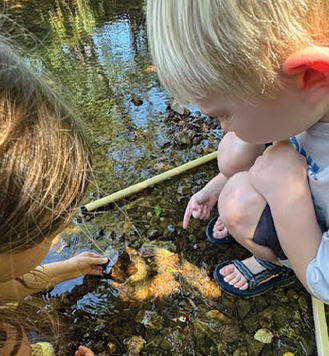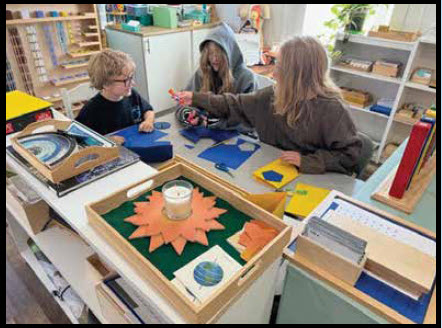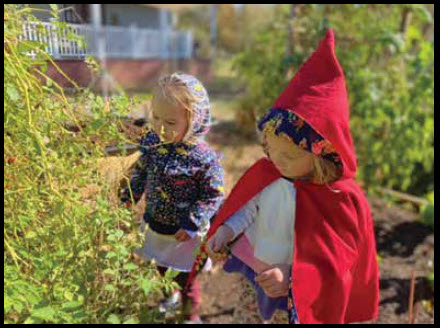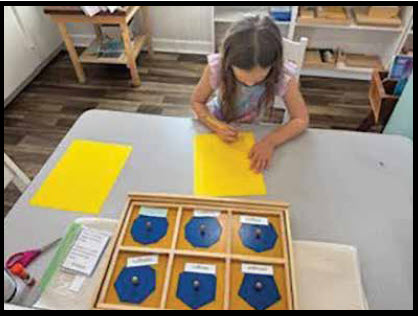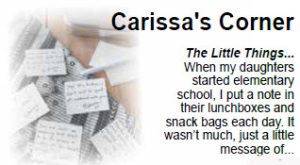By: Brandi Harris
Today, I’m going to share a story with you. At the beginning of this story, Sarah is seven and in her second week at a new school. Sarah loves everything about science, especially conducting experiments. Yesterday, she heard a story called “The Leaf Factory.” Afterwards, she completed an experiment and wrote about it in her journal. She could hardly wait for the next story! So far, Sarah spends all her time in science, where she feels safe and comfortable.
By the third day at her new school, the teacher noticed Sarah’s activities followed a pattern. Sarah always avoided a certain area. She would walk the long way around the tables, as far away from the shelves as she could get, tiptoeing by the children working with grammar materials. She only left science to gather supplies, each time carefully avoiding the attention of anyone near grammar.
What Sarah doesn’t love is reading. Each week at her last school, she would meet with the teacher and her assigned group to practice. Her reading wasn’t the worst, but it was slow and choppy and sounded weird in her ears. Over time, she became embarrassed and began avoiding reading altogether.
Sarah’s new Montessori teacher didn’t know exactly why Sarah was avoiding grammar. She seemed eager enough for most stories and activities. She obviously loved learning. When she reviewed Sarah’s file from her previous school, she realized Sarah’s name was often put on the yellow and red sections of the classroom behavior chart. She felt Sarah may be discouraged.
The Montessori teacher observed Sarah was quite capable. She could hear Sarah slowly sounding out words on the experiment cards. She’d seen her ask classmates for help. She also knew Sarah was very aware of her surroundings, often watching others working. Keeping all of this in mind, Sarah’s teacher started teaching grammar and phonics lessons just near enough to Sarah for her to overhear. The teacher also suggested older children work with Sarah on projects. A week or so later, the teacher asked Sarah’s friend to invite Sarah to a grammar story. Sarah eagerly accepted the invitation to join and began her first official grammar lesson: suffixes.
The next day, Sarah and a friend worked, building the words in blue letters and adding the suffixes in red letters. Sarah read “Test, Testing, Tested” aloud to her friend from the chart and started the next row of words. The teacher watched Sarah confidently read the whole chart aloud.
What’s so unique about this story? First, the teacher took an indirect approach and incorporated reading into Sarah’s choice activities. She did not intervene or correct. Second, the teacher took cues from Sarah’s behavior. As Sarah built relationships, she willingly joined. In less than a year, Sarah usually chose the position of scribe and orator in group projects. As her self-confidence grew, so did her reading ability.
This type of scenario happens again and again in Montessori schools. In Sarah’s case, her classroom teacher was an AMI trained guide, who knew that the most important thing for Sarah is the construction of her inner self, not the checking of boxes. She knew that Sarah would reach her academic goals from her own drive to learn, once she was ready.
Sarah’s new class was a traditional Montessori class of six- to twelve-year-olds. This grouping of different levels works to all the students’ advantage. It allowed Sarah to meet her educational goals, becoming an important and admired leader, while the older student moved into the adolescent group with confidence and a sense of fulfillment.
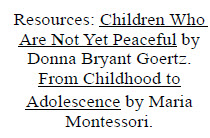 The Montessori teacher, or “guide,” is there to inspire. Her stories offer just enough information to ignite a need to know more, inspiring children to research the “why” and “how.” It is truly magical to see. The first story of the year teaches children that all things follow a natural law, even humans. But we humans are special. We have three unique gifts that set us apart from other living creatures. We have a mind to think, a heart to love, and hands to work. By creating stories filled with gratitude for those who’ve gone before us and for our special gifts, guides instill a sense of how all things are interconnected and all things are important.
The Montessori teacher, or “guide,” is there to inspire. Her stories offer just enough information to ignite a need to know more, inspiring children to research the “why” and “how.” It is truly magical to see. The first story of the year teaches children that all things follow a natural law, even humans. But we humans are special. We have three unique gifts that set us apart from other living creatures. We have a mind to think, a heart to love, and hands to work. By creating stories filled with gratitude for those who’ve gone before us and for our special gifts, guides instill a sense of how all things are interconnected and all things are important.
As in Sarah’s case, the trained Montessori guide takes great care to protect children’s self-esteem and dignity in all areas of learning and discipline. For those who’ve experienced hardships, the guide helps rekindle their inner drive by sparking curiosity and building confidence.
Our local Montessori community is a homeschool group called Mooresville Montessori located in East Limestone. To find out more about joining or about career opportunities, please visit:
By: Brandi Harris


